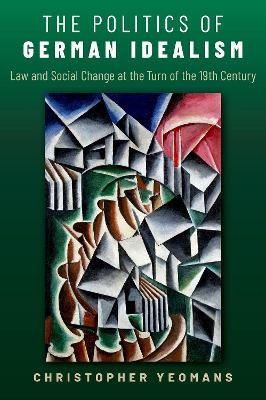
The Politics of German Idealism
Oxford University Press Inc (Verlag)
978-0-19-766730-9 (ISBN)
The Politics of German Idealism reconstructs the political philosophies of Kant, Fichte and Hegel against the background of their social-historical context. Christopher Yeomans' guiding thought is to understand German Idealist political philosophy as political, i.e., as a set of policy options and institutional designs aimed at a broadly but distinctively German set of social problems. 'Political' here refers to use of the state's power to enforce law, and 'social' to the norms and groups which are regulated by that enforcement, but which also antedate or exceed that enforcement. Because the power to enforce law is very much still being actualized by state-building in the period at issue, 'political' refers quite narrowly to a certain kind of practical legal project rather than to a perennial set of problems from the history of philosophy. By way of method, Yeomans claims that to reveal the political nature of German Idealist political philosophy requires understanding German Idealism as both taking place in and conceptualizing its own historical present--this is the sense in which it is not only political, but political philosophy. The most important general feature of the historical present of the German Idealists is the way in which the period from 1770 to 1830 was a transitional period between early and late modernity, a so-called saddle period (Sattelzeit) in which the metaphor is of a Bergsattel or shallow valley between two mountain peaks.
Christopher Yeomans received his PhD at the University of California, Riverside in 2005. He began his academic career at the University of California, Berkeley, where he studied primarily linguistics, literature, and literary theory. Eventually literary theory led him to critical theory and then to the classical German philosophy that serves as its foundation. After a dissertation on Hegel's theory of free will, he then became an assistant professor of philosophy at Kenyon College, joining the Purdue faculty in 2009. His broad project is to develop a political theory that integrates the conceptual riches of the Kantian theory of autonomy (free will), the phenomenological riches of an expressivist theory of moral psychology, and the political riches of concrete social and historical description.
Acknowledgements
Abbreviations
Chapter 1: Introduction
Part I: Legal Standing Historicized
Chapter 2: Kant and the Provisionality of Right
Chapter 3: Hegel and the Plurality of Legal Standing
Part II: Private Law
Chapter 4: Family
Chapter 5: Property
Chapter 6: Inheritance
Part III: Public Law
Chapter 7: Fichte's Three Political Philosophies
Chapter 8: Hegel's State
Chapter 9: Conclusion
Bibliography
Index
| Erscheinungsdatum | 27.05.2023 |
|---|---|
| Verlagsort | New York |
| Sprache | englisch |
| Maße | 237 x 162 mm |
| Gewicht | 513 g |
| Themenwelt | Geisteswissenschaften ► Philosophie ► Erkenntnistheorie / Wissenschaftstheorie |
| Geisteswissenschaften ► Philosophie ► Geschichte der Philosophie | |
| Geisteswissenschaften ► Philosophie ► Philosophie der Neuzeit | |
| Sozialwissenschaften | |
| ISBN-10 | 0-19-766730-9 / 0197667309 |
| ISBN-13 | 978-0-19-766730-9 / 9780197667309 |
| Zustand | Neuware |
| Informationen gemäß Produktsicherheitsverordnung (GPSR) | |
| Haben Sie eine Frage zum Produkt? |
aus dem Bereich

![Was heißt Denken?. Vorlesung Wintersemester 1951/52. [Was bedeutet das alles?] - Martin Heidegger](/media/113619842)
